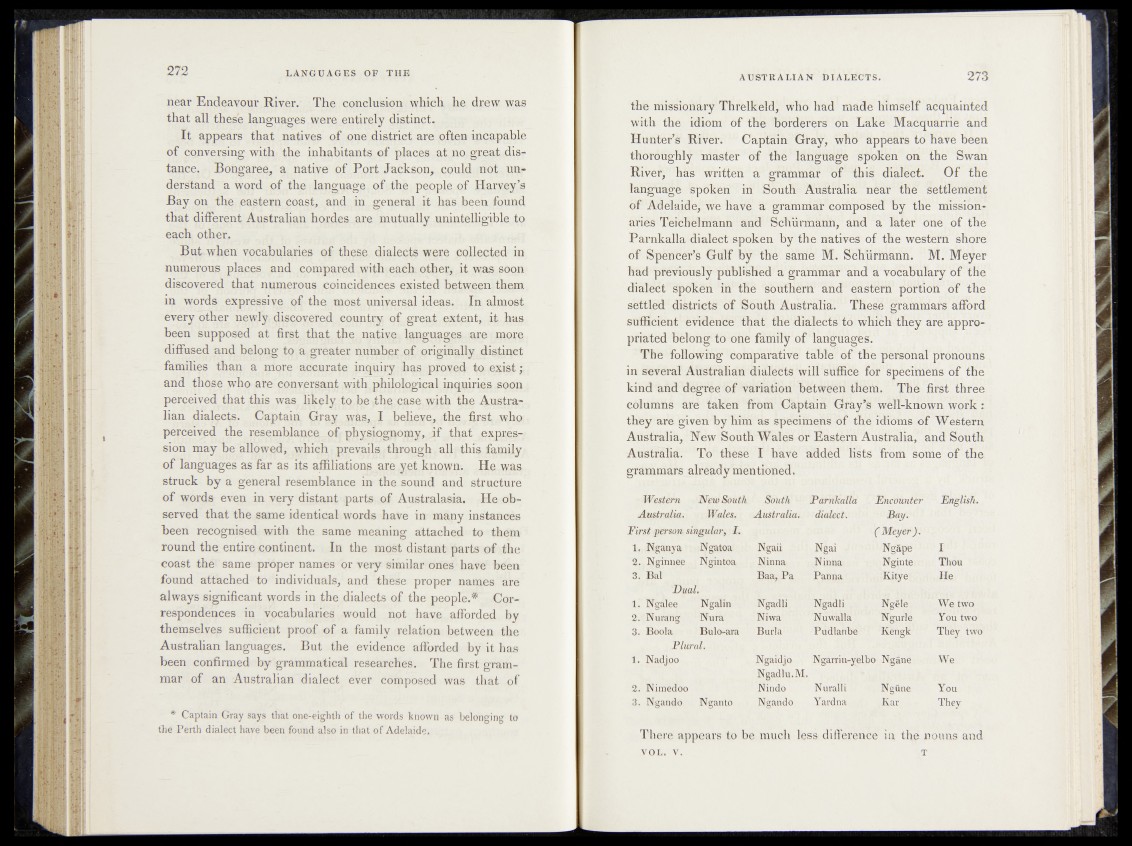
near Endeavour River. The conclusion which, he d^eiy was
that all these languages were entirely distinct, .
It appears that natives ojÇ one district are often incapable
of conversing with the inhabitants of places at no, great distance.
Bongaree, a native of Port Jackson, could not x understand
a word of the language o fth e people.of Harvey’s
Bay on the .eastern coast, and in general it has been, found
that different Australian hordes, are mutually unintelligible, to
each, other.
But-when vocabularies of these, dialects were collected in
numerous places and compared with each, other, it was soon
discovered that numerous coincidences existed bçt^©n*tbem
in words expressive of the most pfoyersal ideas. . In almost
every other nearly, discovered^ e o u n o f ( great extent, it has
been supposed at first that the native languages, are more
diffused and belong tq a. greater number of originally distinct
families than a more accurate inquiry has proved; to mpsjt i
and those who are conversant with philological inquiries soon
perceived that this was likely to befhe.cq.se^jth the Australian
dialects. Captain Cray was, J ..Ijejyeye,Abe^first^whpi,
perceived the resemblance. of physiognomy, if that expref-/
sion may be allowed, which ? prevails .-throughajdpthis family
of languages as far as its affiliations are yet known*. He was.
struck by a general resemblance in the sound and structure
of words even in very distant parts of Australasia. He observed
that the same identical words have in' many instances
been recognised with the same meaning attached to them
round the entire continent. In the most distant parts of the
coast the same proper names or very similar ones have been
found attached to individuals, and these proper names are
always significant words in the dialects of the people.* Correspondences
in vocabularies would not have afforded fey
themselves sufficient proof of a family relation between the
Australian languages. But the evidence afforded by it has
been confirmed by grammatical researches. The first grammar
of an Australian dialect ever composed was that of
* Captain Gray says that one-eighth of the words known-as belonging to
the Perth dialect have been found also in that of Adelaide,
the missionary Threlkeld, who had made himself acquainted
with the idiom of the borderers on Lake Macquarrie and
Hunter’s River. ! ; Captain Gray, who appears to have been
thoroughly master * of the: lâhgtrâge spoken on the Swan
River;’ has written a grammar of this dialect. Of the
language ‘spoken in! South Australia near the settlement
of Adelaide,' We have a grammar cofioposed by the missionaries
Teichelm'ann and Schurmann, aiiki a later one of the
Parnkalla dialect, spoken by the natives of the western shore
of âpifSSlwÈ Gulf by thé s^foe' M. Schurmann. M. Meyer
had previously published a grammar and a vocabulary of the
dialeet Spoken in the southern and eastern portion of the
settled districts of South Australia. These grammar^ afford
sufficient evidence that the dialects to which they are appropriated
bblon^O ;ohe family of "làngùàgës. .
The following comparative table of the personal pronouns
in several Australian dialects will suffice for specimens of the
kind and degree of variation between them. The first three
columns are taken from Chptain Gray’S well-known work:
they are given by him as SpëcimèjN; öf thé idioms of Western
Australia, New South Walesi or Eastern Australia, and South
Australia. To' theèë I have added lists from some of the
grammars already mentioned.
Western New South South - Parnkalla Encounter English.
Australia. Wales. Australia. dialeet. Bay.
First persan singular, J. ( Meyer).
l^lNgamya ; Ngatoa Ngaii Ngai -s Ngâpe : I
2.. Nginnee Ngintoa Ninna sNinna Nginte^ Thou
3. Bal Baa, Pa Panna Kitye He
l)ual.
1. Ngalee Ngalin Ngadli Ngadli , Ngële u We two
2.'Nurang Nura Niwa Nuwalla Ngurïe You two
3. Boola Bulo-ara Burla Pudlanbe Kengk They two
Plural.
1. Nadjoo Ngaidjo , Ngarrin-yelbo Ngäne We
Ngadlu.M.
2. Nimedoo Nindo Nuralli Ngüne You
3. Ngando Nganto Ngando Yardna Kar They
There appears to be much less difference in the nouns and
VOL. v. T